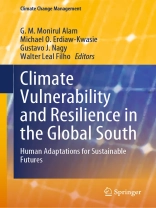This book provides hands-on conceptual, theoretical, and case study discussions on vulnerability and resilience in the global south. This book covers the core of adaptation strategies in developing countries context in an easy-to-follow theoretical and empirical examples. This book shares contemporary approaches on vulnerability, adaptation strategies, and resilience, which aim to assist its targeted audience (academics, policymakers, and practitioners) to understand and make informed decisions in a wide variety of real-world resilience situations.
Tabella dei contenuti
Climate Risks, Adaptation and Vulnerability in Developing Countries of Sub-Saharan Africa and South Asia.- Climate Modeling, Drought Risk Assessment and Adaptation Strategies in the Western Part of Bangladesh.- Contextualizing Resilience amidst Rapid Urbanization in Kenya Through Rural-urban Linkages.- Modeling and Forecasting Climate Change Impact on Groundwater Fluctuations in Northwest Bangladesh.- Modeling Household Socio-Economic Vulnerability to Natural Disaster in Teesta Basin, Bangladesh.- Resilience for Disaster Management: Opportunities and Challenges.- Hailstorms in Northern Bangladesh: Investigating hazard prioritization by and perceived risks for farmers.- Assessing and mapping spatial variations in climate change and climatic hazards in Bangladesh.- Climate Change Vulnerability and its Impacts on Live and Livelihood Patterns in the South-Middle Coastal Areas of Bangladesh.- Temporal Evaluation of Climate Change on Land Use and Land Cover Changes in the Southeastern Region of Bangladesh from 2001 to 2016.












